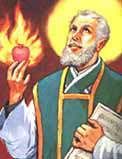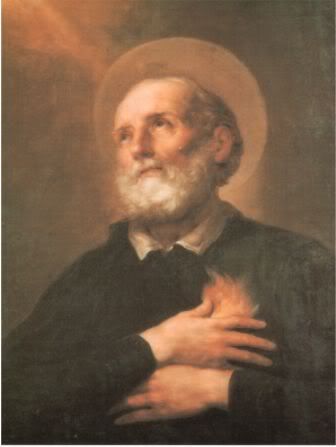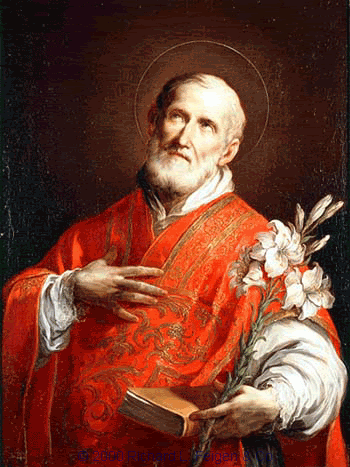Today, May 26, we celebrate the feast day of Saint Philip Neri (1515-1595), an unusual Catholic for his time. Intensely spiritual, Philip was also a bit odd, by society’s standards, always joyful, prone to telling jokes, and breaking into song. His demeanor and behavior contradicted the prevailing attitude of what “holy” implied, but his faith converted many—both those who had faltered in their faith within the Church, and those outside the faith as well. Saint Philip Neri made his faith enjoyable, and his contagious mirth spread throughout both the order he founded and the entire counter-reformation Church. His life’s motto can be summed up in one of his well-known quotations: "Cheerfulness strengthens the heart and makes us persevere in a good life. Therefore the servant of God ought always to be in good spirits."
Saint Philip was born in Florence, Italy, and from the moment of his birth demonstrated the capriciousness, impulsivity, spontaneity, and humor which would mark his character throughout his life. He was known in childhood for jokes and pranks, although his clever humor was never mean. Given that his family was not well off, at 18 he was sent to work with an older cousin who had become a successful businessman. It appeared the Philip was poised to follow in his footsteps. However, sometime during these early stages of his adult life, Philip was called to the Lord. While praying in a small Dominican chapel, built into the fissure of a mountainside, he received a vision which informed him that he had an apostolate in Rome. In that moment, he decided to leave the business world and dedicate his life to God.
Philip left his cousin and moved to Rome, where he worked as a tutor and himself studied philosophy and theology. Repeatedly struck with the thought that his studies were interfering with his prayer life, he gave them up, threw away his books, and became a hermit. He spent his days and nights in prayer, oftentimes at the Catacombs of Saint Sebastian, and during one evening prayer experienced a miraculous occurrence which filled him with the fire of God. As he was praying, a globe of fire hovered before him, and then moved into his mouth, lodging in his heart, and in ecstasy, expanding it (upon autopsy after his death, his ribcage was found to be cracked to accommodate the sudden growth of his heart). So filled with the Holy Spirit—like the disciples at Pentecost—he left the catacombs and began preaching to anyone who would listen!
By age 33, Philip had started his own confraternity—the Confraternity of the Most Holy Trinity—a group of laity who ministered to pilgrims visiting Rome without anyplace to stay. Convinced by his confessor that he could do more good as a priest, Philip received instruction and was ordained at 36. His customary greeting became, "Well, brothers, when shall we begin to do good?"
Philip became well-known as a loving and patient man, and was sought out for confession. A mystic, he could read the souls of his penitents, received visions (including visions of the Blessed Virgin Mary), and was granted the gift of prophecy. His body was known to levitate during Mass. His heart burned for his congregation, and he realized that he needed to do more to help them avoid sin. For Saint Philip, it wasn’t sufficient to provide spiritual guidance in the confessional, he wanted to provide opportunities outside to occupy the minds of those who came to him. For example, during Carnival—when Philip was worried that his congregation would have ample opportunity to sin—he organized a pilgrimage to seven churches. The participants walked twelve miles in prayer, visiting the churches, with a picnic lunch accompanied by stringed music during the day. By the end, they were too tired to sin.
An Excerpt from The Life of Saint Philip Neri by Pietro Giacomo Bacci, details his miraculous levitations:
He was often seen with his whole body raised in the air; among others Paolo Sfondrato, Cardinal of S Cecilia, saw him in prayer raised several spans from the ground, indeed almost to the ceiling, as he told Paul V. a little before his death…
Father Gregorio Ozes, the Dominican, declared that before he entered religion he also saw Philip raised in the air and with a resplendent light around him; and F Francesco Maria Tarugi, that he had beheld him raised a palm above his bed when the Saint was praying once for Tarugi's deliverance from a temptation of sloth, which immediately left him. These occurrences were not confined to private places or witnessed only by a few; even in churches and public places the Saint was carried away against his will into ecstasies. On one occasion he was praying in St Peter's at the tombs of the Apostles, when his whole body was seen to rise suddenly into the air, with his clothes gathered up as they had been when he was kneeling, and then to descend with equal suddenness; after which, fearing that he might have been observed, he fled away with the utmost rapidity. The same thing happened in many other churches, so that when he entered a church in company with others, he used to stay a very little time, only saying a Pater and Ave and then rising from his knees, to prevent the possibility of his going into an ecstasy.
He was repeatedly seen raised into the air when he was saying mass. At Torre di Specchi some of the nuns saw him three or four palms above the ground during mass. A little girl who was at his mass at S Girolamo saw him about two palms from the ground, and turning to her mother said with childish simplicity, "Mother, I think that father must be possessed; see how he stays in the air!" but the mother replied, "Hold your tongue, it is a Saint in an ecstasy."
Saint Philip wanted to protect his flock from sin on a daily basis, and undertook this activity with vigor. He made himself available at any hour, and people called upon him, often at night, when tempted by sin. He is famous for saying, after being criticized by this unorthodox approach, "They can chop wood on my back so long as they do not sin." When pressed even further, and asked why he allowed these penitents to pull him away from his evening prayers, Philip described the activity as “leaving Christ for Christ.” The sound of the bell ringing, letting him know someone was waiting for confession, filled his heart with joy.
Saint Philip invited members to a semi-structured afternoon prayer service of Scripture, readings, and hymns. Eventually, with another priest, an Oratory was built, and the meetings given more structure. The vast number of men attending grew, drawing the attention of Church officials and rousing the jealousy of other members of the clergy. Accused of heresy for introducing “novelties” into the faith, as well as allowing laity to sing and preach, the Pope’s Vicar demanded the Oratory be stopped. Philip obeyed immediately, despite his profound sadness. When his accuser died a short time later, the Pope authorized the Oratory to resume.
Known as the Congregation of the Oratory, Saint Philip had a small church-- the Church of Santa Maria in Vallicella (today known as the Chiesa Nuova)--constructed and began ministering to his flock in his special humorous, charming manner. He refused no one in his Church, and his inclusiveness often led to their conversion. His jokes were designed to increase the humility of others, gently, and with humor. His own humility was often the subject of jokes. To increase his humility, Saint Philip would often wear ridiculous clothing and shave only half his beard to draw insults and become the subject of mockery. He encouraged spiritual mortification, rather than physical mortification which was more commonly undertaken at the time. The greater his reputation for holiness became, the sillier and odder he wished to appear. Despite this, many influential figures of the day sought his counsel, and trusted his advice. They would often find him reading books of jokes upon seeking his audience! Hr was offered the position of Cardinal, which he refused in humility.
Despite his outward appearance, Saint Philip was holy and devoted to prayer. He continued his nightly prayer throughout his life, and would become so carried away while preaching in public, that eventually he refused to do so. His advice to others, when asked how to pray was, "Be humble and obedient and the Holy Spirit will teach you."
Dom Pellegrino Altobello, Canon of San Marco in Rome, said of Philip:
Philip was one of the noble line of Saints raised up by God in the sixteenth century to console and bless His Church. After a childhood of angelic beauty, the Holy Spirit drew him away from Florence, the place of his birth, showed him the world, that he might freely renounce it, led him to Rome, modeled him in mind and heart and will, and then, as by a second Pentecost, came down in visible form and filled his soul with light and peace and joy. He would have gone to India, but God reserved him for Rome. There he went on simply from day to day, drawing souls to Jesus, exorcising them in mortification and charity, and binding them together by cheerful devotions; thus, unconsciously to himself, under the hands of Mary, as he said, the Oratory grew up, and all Rome was pervaded and transformed by its spirit. His life was a continuous miracle, his habitual state an ecstasy. He read the hearts of men, foretold their future, knew their eternal destiny. His touch gave health of body; his very look calmed souls in trouble and drove away temptations. He was gay, genial, and irresistibly winning; neither insult nor wrong could dim the brightness of his joy.
Philip lived in an atmosphere of sunshine and gladness which brightened all who came near him. " When I met him in the street," says one, "he would pat my cheek and say, ' Well, how is Don Pellegrino ?' and leave me so full of joy that I could not tell which way I was going." Others said that when he playfully pulled their hair or their ears, their hearts would bound with joy. Marcio Altieri felt such overflowing gladness in his presence that he said Philip's room was a paradise on earth. Fabrizio de Massimi would go in sadness or perplexity and stand at Philip's door; he said it was enough to see him, to be near him. And long after his death, it was enough for many, when troubled, to go into his room, to find their hearts lightened and gladdened. He inspired a boundless confidence and love, and was the common refuge and consoler of all. A gentle jest would convey his rebukes and veil his miracles. The highest honors sought him out, but he put them from him. He died in his eightieth year, A.D. 1595, and bears the grand title of Apostle of Rome.
Philip Neri prayed, "Let me get through today, and I shall not fear tomorrow." He became known as the “Saint of Joy” to the people of Rome, despite having them undertake humorous and oftentimes humbling experiences (like making noblemen parade through the streets of Rome, banging on pots and pans, or making arrogant youth walk a tiny and somewhat ridiculous dog to the amusement of others). In their humility and obedience, they found the joy of Christ.
St Philip died on the 25th of May in 1595. By that time, he had become the friend and confessor of countless people, including Popes and Cardinals. He spent his days, even in old age, in the confessional, bringing pardon and peace to all who came to him. His penances were perfectly suited to the needs of his penitents, never harsher than they could bear, and tinged with his familiar humor. When he died, all of Rome mourned. The city was a very different one than it had been 60 years before upon his arrival. There was a new found faith in the town that soon spread to the entire Catholic world. In gratitude, the Pope called Saint Philip Neri the second apostle of Rome after Saint Peter. In his own words, Saint Philip Neri reminds us: "A joyful heart is more easily made perfect than a downcast one."
Saint Philip Neri, we take ourselves far too seriously most of the time. Help us to add humor to our perspective — remembering always that humor is a gift from God.
O God, as you never fail to enrich your faithful servants with holiness, grant, we pray, that we may be filled with the same Spirit which so wonderfully penetrated the heart of St Philip. We ask this through Christ our Lord. Amen.
Year 2: Day 146 of 365
Prayer Intentions: Hearts of Service
Requested Intentions: Husband’s freedom from illness (L); Personal intentions (S); Successful passing of dental board examination (P); Blessings on a family (Z); Successful permanent employment (C); Healing of a son with autism (J); Son’s successful employment (L); For the intentions of family and relatives, for the Carthusian community (T); For personal intentions (A); Restoration of lost hearing (C); Resolution of relational and financial challenges (S); Comfort following loss of husband, security for family, assistance with housing (B); Healing and return of brother (O); Successful hermitage foundation (S); Support from family, permission to marry (H); Recovery of wife following surgery, freedom from depression (W); Protection and recovery of mentally ill daughter (J); Successful resolution to legal proceedings (N); Freedom from worry and successful employment (M); For successful sale of home and freedom from debt (J); Freedom from pain and illness (E).
Why pray the Rosary every day for a year?
Each time the Blessed Virgin has appeared-- whether it be to Saint Bernadette Soubirous at Lourdes; to Lucia, Jacinta, and Francisco at Fatima; or to Mariette Beco at Banneux-- she has asserted the importance, saving grace, and power of praying the Holy Rosary on a daily basis. Based upon her words, the Rosary is penance and conversion for sinners, a pathway to peace, an end to war, and a powerful act of faith in Jesus Christ. Pope Paul VI presented the Rosary as a powerful means to reach Christ "not merely with Mary but indeed, insofar as this is possible to us, in the same way as Mary, who is certainly the one who thought about Him more than anyone else has ever done."
To show us how this is done, perhaps no one has been more eloquent than the great Cardinal Newman, who wrote: "The great power of the Rosary consists in the fact that it translates the Creed into Prayer. Of course, the Creed is already in a certain sense a prayer and a great act of homage towards God, but the Rosary brings us to meditate again on the great truth of His life and death, and brings this truth close to our hearts. Even Christians, although they know God, usually fear rather than love Him. The strength of the Rosary lies in the particular manner in which it considers these mysteries, since all our thinking about Christ is intertwined with the thought of His Mother, in the relations between Mother and Son; the Holy Family is presented to us, the home in which God lived His infinite love."
As Mary said at Fatima, "Jesus wants to use you to make Me known and loved. He wishes to establish the devotion to My Immaculate Heart throughout the world. I promise salvation to whoever embraces it; these souls will be dear to God, like flowers put by Me to adorn his throne."

Subscribe to:
Post Comments (Atom)





















0 comments:
Post a Comment
Thanks for leaving a comment. If you wish to submit a prayer request, however, please do so above, using the "Contact" tab.